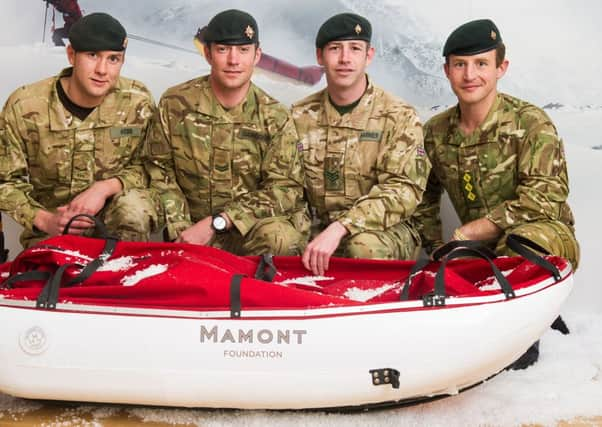Injured soldiers gearing up for trek to the North Pole


IF you happen to have been driving around Catterick recently you might just have caught a glimpse of four blokes walking around with tractor tyres in tow.
“We’ve been doing it on public roads so I’m sure there are a few people who’ve seen us and thought, ‘what are those idiots doing?’” says Ollie Bainbridge.
Advertisement
Hide AdAdvertisement
Hide AdBut there is method to this apparent madness. Ollie, along with three other soldiers, has been training in preparation for an expedition to the North Pole which gets underway next month.
The four serving members of the Royal Dragoon Guards, based at Catterick Garrison in North Yorkshire, were all injured fighting on the front line in Afghanistan and now they’re about to test their recoveries by trekking to the Pole.
They are taking part in the inaugural Mamont Cup, a Polar expedition that brings together explorers and adventurers from across the world, and involves five teams skiing for more than 60 nautical miles.
The teams will face freezing temperatures, notoriously strong winds and ever-changing terrain on the ice cap as they head to the most northerly point on the planet and attempt to become the first team of servicemen to trek to both North and South Poles.
Advertisement
Hide AdAdvertisement
Hide AdAmong those competing is an all-British team led by famous adventurer David Hempleman-Adams. He is being joined by Captain Adam Crookshank, who was hit by fragments during a mortar attack; Sergeant Robbie Harmer, who was shot in the leg, and Lance Corporal Nick Webb, who was blown up by a roadside bomb while on tour in 2010.
The fourth team member is Corporal Bainbridge, who was injured in December 2012, during his second tour of Afghanistan. He and his comrades had been involved in a fire-fight with insurgents when he was hit by shrapnel that left him with a shattered elbow and two broken arms. “I was peppered with shrapnel. The body armour basically saved my life,” he says.
The men returned to fitness after receiving help from the Army Recovery Capability (ARC), a Ministry of Defence-led initiative in partnership with Help for Heroes and the Royal British Legion to provide wounded, injured and sick personnel with the recovery services and resources.
Now they have teamed up with Hempleman-Adams. Three of the men joined him in an expedition to the South Pole in 2012, while Ollie was part of his expedition in 2013 retracing Shackleton’s steps to Antarctica.
Advertisement
Hide AdAdvertisement
Hide AdThis was the first expedition Ollie had been on. “It was pretty amazing. We saw whales and a colony of king penguins, which was just unbelievable.”
Not that it was all plain sailing and breathtaking sights. The weather was a challenge, battering their ship with winds of over 100mph. “We were in a 75-foot yacht but some of the waves were twice the size of the boat and you did start to think, ‘how safe are we?’”
In less than two weeks time the teams will fly out to Norway before starting the expedition on April 15. And while the North Pole will offer a different kind of challenge, being almost completely flat, it will be just as gruelling.
For Ollie, who lives near Doncaster and was awarded the Military Cross for bravery in 2013, it’s all part of the challenge. “We’re raising awareness of the charities and also the Mamont Foundation, which helps fund scientific exploration in the Polar region,” he says.
Advertisement
Hide AdAdvertisement
Hide AdIt’s also a chance to show other service personnel that getting injured doesn’t mean their career is over. “When you get injured it knocks your confidence, and by doing this we want to show that there is still life after being injured, and you can still do things.”